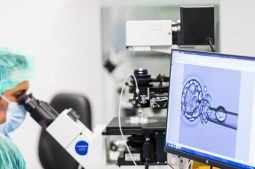
Period Cramps vs Early Pregnancy Cramps: What’s the Difference? Abdominal discomfort is quite common in virtually all women. This may be a premenstrual symptom or something typical of the early months of pregnancy. But how can one distinguish the origin of menstrual cramps? In this article, we address this issue, helping you better understand the differences and similarities between menstrual cramps and early pregnancy cramps.
Differences between period cramps and pregnancy cramps
To understand the differences between period cramps vs early pregnancy cramps, we need to know what causes them. Dysmenorrhea is painful menstruation caused by uterine contractions when the uterine lining sheds during menstruation. These contractions manifest as abdominal pain and may be accompanied by other symptoms such as lower back pain, nausea, or breast tenderness.
On the other hand, early pregnancy cramps result from the changes that the uterus and a woman’s body undergo due to embryo implantation. In this process, the uterus expands and adjusts to accommodate the embryo, resulting in abdominal pains similar to those experienced during menstruation. These pains are part of the characteristic symptoms of this period, such as fatigue, increased urinary frequency, or breast sensitivity.
Period cramps or pregnancy?
As just mentioned, both menstrual cramps and early pregnancy cramps come with very similar symptoms. So, how do you know what kind of cramps you’re experiencing? There are some indicators that can help:
Bleeding
Menstrual cramps usually accompany or occur a few days before menstrual bleeding. However, in the case of early pregnancy cramps, if there is bleeding, it is lighter and has a paler color.
Pain Intensity
Menstrual cramps may be more intense than pregnancy cramps. In any case, if the pain is persistent or debilitating in your daily life, consult with a specialist.
Breast Sensitivity
While this symptom is common to both menstrual cramps and early pregnancy cramps, in the latter case, it may appear with greater intensity.
What do early pregnancy cramps feel like?
Those who have experienced early pregnancy cramps often describe them as mild abdominal pain, less intense than menstrual symptoms. It is common to feel pressure in the lower abdomen, which can last from a few minutes to a couple of days.
However, each woman is unique and experiences symptoms differently or with varying intensity. Additionally, these cramps are often accompanied by the previously mentioned symptoms, such as fatigue and breast tenderness.
Do you still get period cramps when pregnant?
Yes, it is possible that some women may continue to experience mild menstrual cramps during the early weeks of pregnancy. This could be due to the uterus adapting to its new situation, experiencing contractions similar to those that occur during menstruation. However, it is important to note that these discomforts should be mild and not accompanied by heavy bleeding. Should this occur, consult with your medical team immediately.
Dealing with period cramps
Given the previously explained symptoms, menstrual cramps cause discomfort for the woman experiencing them. However, there are some tips that can help alleviate their discomfort.
- Pain relievers, as long as your healthcare professional deems it necessary and following their recommendations.
- Heat: Applying a heating pad or a device that emits heat can help alleviate discomfort in the abdominal or lumbar area.
- Engage in moderate exercise, such as walking or yoga, as exercise increases blood flow and releases endorphins.
- Maintain a healthy diet by avoiding caffeine, processed foods, sugar, and salt, which can help reduce fluid retention and bloating.
- Consider nutritional supplements like calcium, magnesium, or vitamin B6 to help regulate hormone levels. Remember to consult with your medical team before making any changes to your daily routine
Dealing with early pregnancy cramps
On the other hand, when it comes to early pregnancy cramps, it is important to pay attention to what your body is experiencing at that time. While they are less intense than menstrual cramps, it is important to stay vigilant and follow some recommendations.
- Ensure you maintain an optimal level of rest and sleep.
- Stay hydrated, as dehydration can worsen the symptoms.
- Reduce your stress levels through relaxation techniques.
If you experience any symptoms of early pregnancy cramps that concern you, do not hesitate to consult with your doctor as soon as possible.
As seen throughout the entire article, both menstrual cramps and early pregnancy cramps present with similar symptoms. Therefore, it is essential to be attentive to what your body is experiencing, how long it lasts, and how intense it is. And, of course, be aware of the accompanying symptoms for either of these two types of cramps.





Comments are closed here.